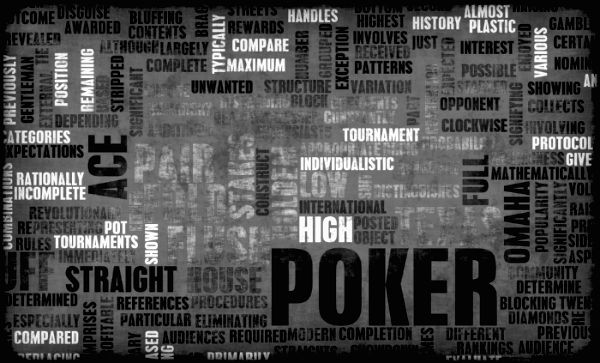Author: Daniel King | Posted on: 2021-04-22 | Last updated on: 2021-09-22
Since its creation in the early 1800’s – Poker has managed to make its mark and solidify its place in Casinos all across the globe. Regardless of your stance on gambling, chances are you’ve heard mention of some of the key terms of poker from friends, family and even on tv. You are also probably familiar with certain aspects of the game, which remain consistent regardless of the variation you decide to play.


Welcome Bonus
100% up to 6000 EUR + 100 FS
Test
Bonus


Welcome Bonus
100% + 100 Free Spins € 1 000
Test
Bonus


Welcome Bonus
100% + 100 Free Spins € 1 000
Test
Bonus


Welcome Bonus
100% up to 500 EUR + 200 FS
3
Bonus


Welcome Bonus
Welcome Bonus up to 200 EUR
Test
Bonus
This includes but is not limited to the fact that poker in and of itself is a card game first and foremost, which means that all the players – and in some instances the dealer – are dealt out cards to form their ‘hand’ and that sure hands are worth more than others.
You are probably also familiar with the concept that most – but not all – poker variations are played with ‘poker chips’, simple casino tokens that hold varying forms of value. These are used as an easy form of currency while playing regardless of if you’re playing among friends or in a casino.
Now is the place where we are more than likely treading into unfamiliar territory when learning how to play poker. What variations of poker are there – how do you differentiate them? What are the rules in the house and a tournament? How do you know if you have a good hand or not? In all honesty, Poker is a lot easier than it looks. You may have some difficulty remembering the value of each hand or the exact terminology – but before you know it, you’ll be playing poker like a pro!

As previously mentioned, various types of poker can be found in Casinos all around the world. Some you may be familiar with, others you may not have even heard of before! Each new variation of poker is new and exciting, and it’s up to you to decide which versions you want to play!
One aspect of Poker that stays the same is the value of the cards. Once you familiarize yourself with the scoring in poker – you are sure to play any game with little to no difficulty. Each hand varies in value depending on the cards you have on hand, and it’s up to you as the player to get the highest playing hand to win the pot. For example, a Royal Flush is worth more than a Single Pair. More so, a Single Pair of Queens will be worth more than a pair of sevens.
If two players manage to get a hand that holds the same value, the pot will be split between them if their entire hand holds the same value. For example, if two players ended the showdown with a pair of Queens and a Jack, then the pot would be split. However, if one player had a pair of Queens and a Jack while the other only had a pair of Queens and a Nine, the pot would be given to the latter for their higher-valued card.
Whether or not you already know how to play poker – you are probably familiar with the fact that a Royal Flush is the highest-ranking hand in the game. This includes the player having a hand containing an Ace, King, Queen, Jack and a Ten of all the same Suit. Such as Hearts or Clubs.
The next high-ranking hand on the list is the Straight Flush. Like the royal flush – this hand contains five sequencing cards of all the same suit, such as a Five, Six, Seven, Eight and Nine of Clubs.
Next up is the Four of a Kind. Some Poker variations may even include the possibility of a Five of a Kind if there are any wild-cards or more decks of cards, including. The Four of a Kind merely consists of the player holding four cards of the same value, such as four Jacks.
A Flush – similar to a Royal Flush – merely indicated that you hold five cards of the same suit. In this case, not in a sequence or of the royal variations, as we have previously mentioned in our intro, play poker. These can include any random number of cards so long as they are in the same suit, such as an Ace, a Five, a Seven, a Two and Jack of Spades.
As previously mentioned, a Straight merely indicates that the cards in hand managed to make out a sequence. This time, however, these cards can hold varying suits. The suits themselves do not matter in this instance, and instead, your focus is on the numbers themselves. For example, in your hand, you can have Two of Clubs, Three of Spades, Four of Clubs, Five of Hearts and Six of Hearts.
Similar to Four of a Kind but with much less value. A Three of a Kind consists of having three cards of the same value – such as three Tens.
One of the lowest ranking cards consists of only having Two Pairs in your hand. The value of said cards and their suit is unimportant unless another opponent in the showdown also has two pairs. For example, if another individual who’s learning how to play poker has a pair of Tens and a pair of Sevens, whereas you have a pair of Queens and a pair of Aces – then you would be the one to win the pot.
Similar to the Two Pairs, this hand merely consists of the player having a single pair of cards in their hand. Once again, the value is unimportant unless you and another individual have the same hand in the showdown. If you have a pair of Six’s and the other individual has a pair of Aces, then they are the ones to win the pot.
The lowest ranking card in this list will have to be the high card. This is one of the most common hands for players to get – especially when the cards are first being dealt. This hand consists of the player having a single high-valued card such as a Jack, Queen, King or Ace. Even a Ten may be applicable if need be.
As previously mentioned, whether you’re learning with friends or learning to play for an upcoming tournament – there are different variations and adaptations of poker to be played. Whether you choose only to learn one or two of these variants or plan to learn how to play poker with the whole lot – here are the basics and rules to the many alternative forms that are played across the country.

To start, each player is given two cards (holecards) to keep in their hand and keep hidden from other players before a round of betting begins. Next is the Flop – where the dealer will produce three community cards in the centre of the table. These cards will be included to form the player’s hands during the showdown.
Then once another round of bets has been made, the dealer adds another Community card. Another round of betting commences before The River, where the dealer adds the final card to the board.
One last round of betting commences before the Showdown – where each player will use their best five-card combination of their holecards with the community cards in an attempt to gain a higher valued hand than all the other players. Whoever has the highest value hand wins the pot. Besides, players may choose to play the board, which consists of throwing away their holecards and playing the hand of community cards on the table.
Process of the Betting
While betting rules can vary depending on the variation of Hold ’em you are playing. Most variations will include a Big Blind. The Big Blind is the individual seated left of the dealer who will be forced to make the first bet in a game, inciting the amount everyone else at the table with having to bet. In addition, the Big Blind can raise this bet during any betting round.
During the betting round, players can call/check to match a previous check, fold their cards and wait for the next deal to play again, or bet/raise – allowing other players to check/call. The minimum raise you could make is equal to the size of the last bet made. A minimum bet is simply meeting the bet of the Big Blind, whereas a Maximum Bet or going All-In is betting all of your chips.
Omaha is very similar in the way of rules to Texas Hold ’em, the main difference being that instead of creating a high valued hand to play with a mixture of holecards and community cards – you are forced to make a hand with precisely two holecards and three community cards.
To start, the dealer gives each player four holecards before the first round of betting commences. Afterwhich, the dealer turns over three community cards, and the next round of betting begins. The dealer then turns over the River card, the final card to be added to the list of community cards and forces the last round of betting to commence. Once again, each player must create a hand with two holecards and three community cards during the showdown.
Process of the Betting
Most of the rules remain the same throughout the many Omaha variations, aside from those regarding betting. Most popular variations include Pot Limit, No Limit and Fixed Limit Omaha. Much like Hold ’em, the Big Blind is the one who is seated beside the dealer and will be forced to make the first bet. Preceding this, other players can call, raise or fold.
In Pot-Limit, a minimum bet is the Big Blinds bet’s size, but players can bet up to the pot size. The minimum raise must be the same as the previous raise or bet in the same round, and there is no cap on the number of raises.
In No-Limit, the minimum bet is the size of the Big Blinds initial bet once again, but all players can bet as much as they want. The minimum raise is equal to the previous bet made on the same round, but players can bet all of their chips if need be.
In Fixed- Limit, all bets are pre-determined where all players will need to bet/raise the same amount at the Big Blind. All bets double, and up to four bets are allowed per player on the second to last round.
Like Hold ’em, the player is given a set of holecards – however, in this variation, the player is given three holecards. Two of which will be kept secret from the other players, and one will be dealt upright for the other players to see (doorcard).
First, each player will need to bet a predetermined amount into the pot before any cards can be dealt and any bets can be made. The players make their first round of bets before the dealer gives each player another doorcard – this pattern will continue for three more rounds before the last round of betting finishes. The showdown commences, and whoever has the highest valued hand wins!
Process of the Betting
The first round of betting is started by a forced bet by whoever has the lowest doorcard by suit. Afterwards, those with the highest doorcard initiate the betting. In all Fixed-Limit variations of Stud, the smaller bet is wagered on the first two betting rounds – followed by the larger bet after betting on the fifth, sixth and seventh cards. If there is an open pair on the fourth card, any player can make a smaller or larger bet.
When it comes to poker tournaments, some players will choose to play them differently depending on the type of poker, the size of the casino, the number of players, and the winning pot’s size. While certain strategies may be effective in play in certain situations and not in others, here we will give you some strategies for any circumstance.
When taking your place at the table, ensure that you remain aware of the fact that those seated to the left of the dealer will be given the title the Big Blind (and in some cases to the left of them will be the Little Blind) and will subsequently be forced to make various bets.
Regardless if you’re just learning how to play poker or you’re simply looking for some refresher tips – Depending on the way you wish to play the game, avoiding or rushing to claim this spot will be in your best interest.
Each poker game – regardless of the variation you play – can be broken down into three separate stages. The beginning of the game, the middle, and the end stages. These stages will vary depending on how many rounds the particular game has, but it’s almost always safe to say that if you’re going to play aggressively – make sure you do so in the last round.
Unlike learning how to play standard poker, you cannot just cash out the tokens you’ve won thus far and call it a day during a tournament. Your best bet is to reach the final table and collect as many tournament chips as possible in the case of a contest.

Even if you are in the lead with the most chips, don’t hesitate to gain more. Before you know it, you may be falling behind and wishing you had spent more time collecting these chips.
Especially once you get later on into the game, players will be keener and keener on protecting their stacks of chips. It’s also at this time that those with short-stacks are relatively easy to pick out among the crowd.
If you’ve followed all the steps thus far and find yourself deep-stacked with tons and tons of chips – you can certainly use this to your advantage. When you have chips to spend and little to lose – it can make for an easy way to intimidate those with fewer chips, allowing you to make easy bluffs.
When you’re first starting out learning how to play poker and getting the hang of the rules – it’s very natural to make some mistakes here and there. Therefore we’ve outlined a few mistakes that beginners usually make so you can help avoid them.
As soon as you’ve noticed that you’ve got a good hand – it can be tempting to go all-in. However, it’s important to remember that things can change on a dime.
Other players may gain better hands later on, and/or more community cards may be played on the table and in turn making your hand less valuable. Play smartly – and wait until the final rounds to get aggressive.
A big issue when it comes to new players is that, more often than not, they are never sure when to quit.
Especially when you’re playing on a budget, it’s important to recognize when you have a poor hand and should fold. It’s best not to push your luck and know when to quit.
It can be tempting to try and seem professional around other players when learning how to play poker in attempting to play or bluff your way through every hand.
Similarly, another big issue beginners have is being too scared to take a chance. Some players may avoid playing into the showdown until they have one of the big three value hands – which may allow them to gain some wins here and there, but it is most certainly not the most sure-fire method.
Finally, another massive problem new players have is not correctly measuring their bets. When new players have a high-value hand, they often tend to bet too little, whereas those with poorer hands tend to bet way too high. If you find you’re struggling to find a healthy medium, feel free to take a moment to review the bets and hands that are valued in the game.
Poker is straightforward to learn, and serious players should get a grasp of this game without any difficulty. The first rule to know about poker is that it's often played amongst two to ten players. In poker, the objective is simple - collect a pot and land a hand.
For beginners, a poker session should last for a maximum of two hours since most are still getting used to the intricacies associated with poker. On the other hand, professional players can play anywhere between two to eight hours.
Yes, a majority of poker players are smart. They possess the ability to solve arithmetic problems in seconds and the skills needed to handle individuals. The world's best poker players are brilliant and can overcome obstacles associated with this game without flinching.
Absolutely, Canucks can make consistent wins even on low bets. Nonetheless, it's crucial to know that even the best players have their losing days. While you might win consistently, winning every round is practically impossible.
Yes, poker is still profitable as players are still garnering huge payouts daily. However, to achieve this, players would have to put in an extensive amount of time to improve gameplay.